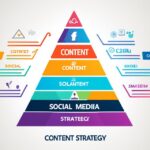Table of Contents
Content marketing plays a vital role in the success of small businesses, allowing them to establish their brand and connect with their target audience. With an effective content strategy, small businesses can stand out in a crowded market, increase online visibility, and drive customer engagement.
But what exactly is a content strategy? In simple terms, it is the creation and distribution of valuable and relevant content aimed at growing, engaging, and retaining an audience. Having a documented content marketing strategy is crucial, as it helps define goals, measure success, and improve processes.
Research shows that 80% of successful content marketers have a documented strategy in place. Why? Because it brings numerous benefits to small businesses, such as increased online visibility, more leads, greater authority, and higher customer engagement. Additionally, a well-executed content marketing strategy can provide businesses with the opportunity to secure more marketing budget in the future.
So, what are the key elements of a powerful content marketing strategy? In the following sections, we will explore the importance of a content marketing strategy for small businesses and provide practical steps to create one. We will also discuss the role of analytics in measuring the success of your content strategy and offer tips for maintaining consistency.
By understanding and implementing these essential elements, small businesses can develop a strong content marketing strategy that helps them achieve their goals and grow their brand.
The Importance of a Content Marketing Strategy for Small Businesses
Implementing a content marketing strategy for small businesses is crucial for several reasons. Firstly, it helps achieve specific goals and define success metrics, leading to more effective content creation and distribution.
Having a clear strategy in place allows businesses to create content that is targeted, relevant, and resonates with their audience. By understanding the needs and preferences of their target market, small businesses can tailor their content to address those pain points and provide solutions. This targeted approach ensures that the content produced is valuable and valuable to the target audience, increasing engagement and driving customer actions.
- Increased online visibility: A well-executed content marketing strategy can significantly increase a small business’s online visibility. By consistently producing high-quality and relevant content, businesses can improve their search engine rankings, making it easier for potential customers to find them.
- Attract more customers: An effective content marketing strategy can help attract more customers to the business’s website or social media platforms. By providing valuable information and showcasing expertise in the industry, businesses can position themselves as trusted authorities, gaining the trust and attention of potential customers.
- Generate more leads: Content marketing is an excellent tool for lead generation. By offering valuable content in exchange for contact information, businesses can build a database of leads for future marketing efforts. These leads are more likely to be interested in the products or services offered, increasing the chances of conversion.
- Establish authority: Content marketing allows small businesses to establish themselves as industry authorities. By consistently producing high-quality content that educates and informs, businesses can build trust and credibility with their audience. This authority can lead to more opportunities, such as speaking engagements, media coverage, and partnerships.
- Customer retention: Engaging with customers through content can also lead to higher customer retention rates. By consistently providing valuable information and addressing their needs, businesses can keep customers engaged and loyal to their brand.
- Potentially more budget: A documented content marketing strategy can make it easier for small businesses to secure a larger marketing budget in the future. By demonstrating the effectiveness of their current strategy and the return on investment, businesses can justify the need for additional resources to further enhance their content marketing efforts.
In summary, a content marketing strategy is a valuable investment for small businesses. It not only helps achieve specific goals and define success metrics but also provides a range of benefits, including increased online visibility, attracting more customers, generating more leads, establishing authority, improving customer retention, and potentially securing a larger marketing budget.
Implementing a content marketing strategy for small businesses is crucial for several reasons. Firstly, it helps achieve specific goals and define success metrics, leading to more effective content creation and distribution. Secondly, a well-executed strategy can increase online visibility, attracting more customers. Additionally, it can generate more leads and establish the business as an authority in its niche. Engaging with customers through content can also lead to higher customer retention rates. Finally, a documented content marketing strategy can make it easier to secure a larger marketing budget in the future.
Key Elements of a Powerful Content Marketing Strategy
A powerful content marketing strategy consists of five key elements that work together to drive success. These elements provide structure, direction, and guidance for building an effective content marketing plan:
- Audience Personas: By creating audience personas, businesses can gain a deep understanding of their target audience. This enables them to create content that is tailored to their audience’s needs, interests, and pain points.
- Brand Story and Positioning: Articulating the company’s history, mission, purpose, and values is essential in shaping the content creation process. A well-defined brand story and positioning provide a clear direction for content and help differentiate the brand from competitors.
- Content Marketing Mission Statement and Owned Media Value Proposition: A content marketing mission statement outlines the purpose, goals, and target audience of the content strategy. The owned media value proposition communicates the unique value that the brand’s content offers to its audience.
- Business Case: A business case outlines the objectives, expected outcomes, and benefits of implementing a content marketing strategy. It serves as a persuasive document to secure the necessary resources and support from stakeholders.
- Action Plan: An action plan details the specific content campaigns and projects that will be executed. It includes content topics, formats, distribution channels, and success metrics to track the effectiveness of the content strategy.
By incorporating these key elements into their content marketing strategy, businesses can build a solid foundation for success and ensure that their content resonates with their target audience.
Implementing these elements takes careful planning and thoughtful execution. The next section will outline the step-by-step process of developing a content marketing strategy for small businesses.
Developing a Content Marketing Strategy: 7 Steps to Success
To create an effective content marketing strategy for small businesses, it is important to follow a step-by-step approach. By implementing these seven key steps, businesses can develop a comprehensive content strategy that resonates with their target audience and drives results.
- Determine your target audience: Research and analyze your existing customers, industry trends, competitors, and buyer personas to gain a deep understanding of your target audience. This will help you craft content that is highly relevant and valuable to them.
- Understand the buyer’s journey: Map out the different stages of the buyer’s journey, from awareness to consideration and decision-making. Creating content that addresses each stage will attract, retain, and convert leads effectively.
- Set clear goals: Define the specific goals and objectives that you want to achieve through your content marketing strategy. This will allow you to measure the effectiveness of your efforts and make data-driven decisions.
- Maintain a consistent brand voice: Ensure that your content aligns with your brand story and positioning. By maintaining a consistent brand voice, you will build brand identity and strengthen relationships with your audience.
- Conduct competitor research: Study your competitors’ content strategies to identify opportunities for differentiation and improvement. This will help you create unique and compelling content that stands out in the market.
- Incorporate keywords and SEO strategies: Optimize your content for search engines by incorporating relevant keywords and implementing SEO best practices. This will improve the visibility of your content and attract organic traffic to your website.
- Create a content calendar and assemble the right talent: Develop a content calendar to plan and organize your content creation and distribution efforts. Identify the right talent, whether in-house or outsourced, to ensure consistent and high-quality content production.
By following these steps, small businesses can create a robust content marketing strategy that drives engagement, generates leads, and helps achieve their business goals.
The Role of Analytics in Content Marketing Strategy
Analytics play a crucial role in measuring the success of a content marketing strategy. By analyzing data and metrics, small businesses can gain insights into the performance of their content and make data-driven decisions. Monitoring analytics allows for the identification of trends, areas of improvement, and the alignment of content with business goals.
“Tracking analytics is like having a GPS system for your content marketing strategy. It helps you navigate the digital landscape, guiding you towards success.
Key metrics to track include:
- Website traffic
- Lead generation
- Conversion rates
- Social media engagement
- Customer feedback
By closely monitoring these metrics, small businesses can evaluate the effectiveness of their content marketing efforts. For example, analyzing website traffic can indicate the reach and visibility of content, while lead generation and conversion rates demonstrate the ability to attract and convert customers. Social media engagement provides insights into audience interaction and sentiment, and customer feedback helps gauge satisfaction and identify areas for improvement.
With analytics as a compass, small businesses can refine their content marketing strategies, optimize their campaigns, and achieve greater success.
| Metric | Significance |
|---|---|
| Website traffic | Showcases the reach and visibility of content |
| Lead generation | Indicates the ability to attract and convert customers |
| Conversion rates | Demonstrates the effectiveness of content in driving desired actions |
| Social media engagement | Provides insights into audience interaction and sentiment |
| Customer feedback | Helps gauge satisfaction and identify areas for improvement |
By analyzing and interpreting these metrics, small businesses can make informed decisions, refine their content strategy, and drive even greater success in their content marketing efforts.
Measuring and analyzing analytics is an ongoing process, enabling continuous improvement and refinement of content marketing strategies. It is essential for small businesses to embrace the power of analytics to understand their audience, optimize their content, and achieve tangible results.
Maintaining a Consistent Content Strategy
A consistent content strategy is vital for small businesses to establish a strong and recognizable brand identity while fostering relationships with their target audience. By maintaining a uniform brand voice and aligning content with the brand story, businesses can effectively communicate their values and resonate with their customers.
To ensure consistency across various platforms and mediums, creating a comprehensive style guide is crucial. This guide should outline the do’s and don’ts of content creation, including tone, language, and messaging guidelines. By following these best practices, businesses can maintain a cohesive and cohesive content strategy that reflects their brand’s unique personality.
“Consistency is key when it comes to content branding. By sticking to a defined brand voice and messaging, customers can easily recognize and connect with your brand.”
In addition to a style guide, conducting competitor research can provide valuable insights into content gaps and opportunities for differentiation. By identifying areas where competitors are not addressing customer needs, businesses can excel and capture the attention of their target audience.
Furthermore, incorporating relevant keywords and implementing effective SEO strategies is essential for improving the visibility and searchability of the content. By optimizing content for search engines, businesses can increase their organic reach and attract a larger audience.
| Benefits of Maintaining a Consistent Content Strategy |
|---|
| Builds brand identity |
| Fosters strong relationships with the target audience |
| Increases brand recognition |
| Improves customer loyalty |
| Enhances brand credibility and authority |
By implementing these best practices, small businesses can maintain a consistent content strategy that effectively communicates their brand’s unique value proposition, resonates with their target audience, and helps to build a robust online presence.
Conclusion
Developing a strong content marketing strategy for small businesses is essential for achieving success in the online world. By following the key steps outlined in this article, businesses can create a content strategy that resonates with their target audience, generates leads, and establishes their brand as an authority in the industry.
Consistency is a fundamental aspect of a successful content strategy. Maintaining a clear brand voice and aligning content with the brand story help build brand identity and foster strong relationships with the audience. By providing valuable and relevant content consistently, businesses can attract and retain a loyal customer base.
Analytics play a vital role in measuring the effectiveness of a content marketing strategy. Through data analysis, businesses can gain valuable insights into the performance of their content and make data-driven decisions. Monitoring key metrics such as website traffic, lead generation, conversion rates, social media engagement, and customer feedback enables businesses to optimize their content strategy for better results.
With the right plan in place, small businesses can unlock their potential and engage their audience effectively. By creating a documented content marketing strategy, businesses can define their goals, establish success metrics, and create processes for continuous improvement. Through consistent branding, data analysis, and audience-centric content, businesses can establish themselves as industry leaders and achieve long-term success in the digital landscape.
FAQ
What is content marketing?
Content marketing is the creation and distribution of valuable, relevant content aimed at growing, engaging, and retaining an audience.
Why is a content marketing strategy important for small businesses?
A well-executed content marketing strategy can help small businesses stand out and promote their brand.
What are the benefits of a content marketing plan?
The benefits of a content marketing plan include increased online visibility, more leads, greater authority, increased customer engagement, and potentially more budget.
What are the key elements of a powerful content marketing strategy?
The key elements of a powerful content marketing strategy include audience personas, brand story and positioning, content marketing mission statement, business case, and an action plan.
What are the steps to develop a content marketing strategy for small businesses?
The steps to develop a content marketing strategy for small businesses involve determining the target audience, understanding the buyer’s journey, setting clear goals, maintaining a consistent brand voice, conducting competitor research, incorporating keywords and SEO strategies, and creating a content calendar.
How does analytics play a role in measuring the success of a content marketing strategy?
Analytics allows small businesses to analyze data and metrics to gain insights into the performance of their content, identify trends, and align content with business goals.
How can small businesses maintain a consistent content strategy?
Small businesses can maintain a consistent content strategy by maintaining a uniform brand voice, aligning content with the brand story, creating a style guide, establishing do’s and don’ts for content creation, and conducting competitor research.













